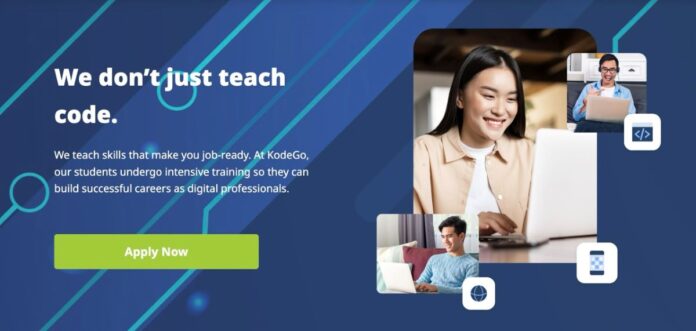The Philippines is on track towards becoming a USD35 billion economy by 2025. But even with the promising outlook, the country’s workforce remains challenged by a digital skills gap that hampers its transformation into a truly digital nation.
According to the 2023 World Digital Competitiveness Ranking by the International Institute for Management Development (IMD), the Philippines ranked 59th out of 64 countries in overall digital competitiveness, showing low rankings on knowledge and talent (63rd), technology (51st), and future readiness (59th). This underscores an urgent need to prioritize digital skills development to ensure the country’s digital competitiveness and sustainable growth.
“In an era defined by digitalization, the importance of digital skills across industries has become undeniable. KodeGo was developed to create more accessible and affordable opportunities for Filipinos to upskill themselves and strengthen their employability with advanced to intermediate digital skills,” said Ina Gervasio, KodeGo chief executive officer.

Launched in 2020, KodeGo is a study now, pay later edutech platform that provides accessible, comprehensive digital skills training programs, including the following:
- Full-stack web development
- Virtual Assistance
- Virtual Bookkeeping
- Basic transcription
“As the Philippine tech industry gears up to expand to 2.5 million full-time employees and generate US$59 billion in revenues by 2028. It’s crucial to ensure our courses align with industry standards. Our mission at KodeGo goes beyond imparting new skills; we’re committed to ensuring our students are not just equipped for the job market but are also highly employable,” Gervasio said.
In line with this, KodeGo introduced a flexible payment scheme that includes a study-now-pay-later format while providing end-to-end career assistance and support for its students post-training. Each curriculum takes between two and 22 weeks to complete.
To date, the platform has over 2,000 graduates, many of whom have achieved meaningful employment opportunities with industry heavyweights such as GCash and Accenture.
Kwentong KodeGo (KodeGo Stories)
At the forefront of KodeGo’s mission is the commitment to empower women and break barriers in the tech industry. To date, out of the almost 2,000 KodeGo graduates, 20% are women looking to learn and make a name for themselves in the tech industry, a number that is constantly growing.
Among Filipinas who took KodeGo’s courses is Lorie Pascual, a former music teacher whose career ground to a halt during the pandemic. While considering what to do to continue providing for her family, one of her churchmates encouraged her to join KodeGo’s full-stack web development boot camp.
“I thought I should try studying a tech course since I had a laptop and internet, I had enough to start with what I had, so I enrolled in KodeGo,” Lorie said.
After 12 weeks of full-time classes, Lorie completed the course and is now a web developer at Aemorph, an internet marketing service company based in Singapore.
Another successful KodeGo graduate is Lorraine Ostan, who had to drop out of her first year in college due to financial difficulties after her father lost his job as an Overseas Filipino Worker (OFW) in the United Arab Emirates.
She decided that she needed to find a job to help her family and raise her young child, which led her to take KodeGo’s full-stack web development program. Two weeks after completing the course, she landed a job in a Japanese offshore company as a web designer and eventually moved on as a software engineer.
“Stories like Lorie’s and Lorraine’s are why we are deeply passionate about what we do. Their journeys highlight the power of education and the opportunities that arise when individuals are equipped with the right skills and support,” Gervasio said.
How to enroll at KodeGo
Those interested in enrolling at KodeGo should go visit kodego.ph, apply on the website, and take a short assessment test.
Upon successful application, students will receive their KodeGo contracts and an invitation to an onboarding session to familiarize themselves with the curriculum and how to use the KodeGo platform. All that’s left to do is complete the training.
Learn more about KodeGo and its courses by visiting kodego.ph
